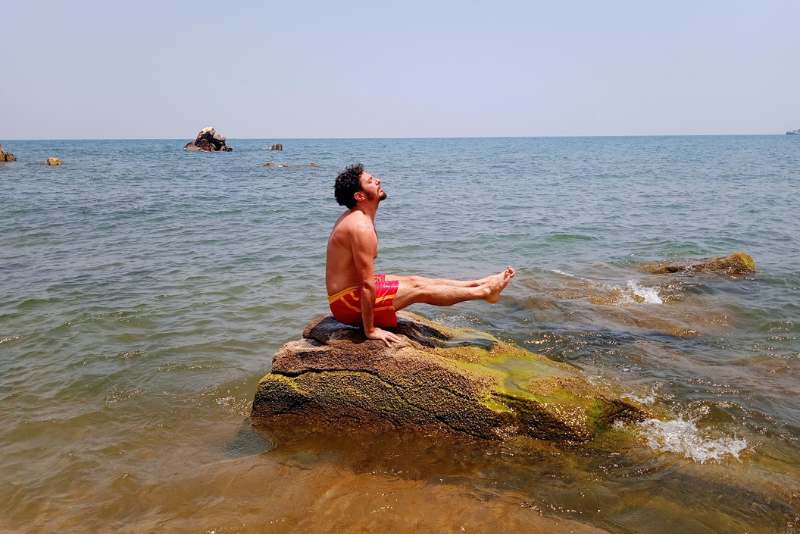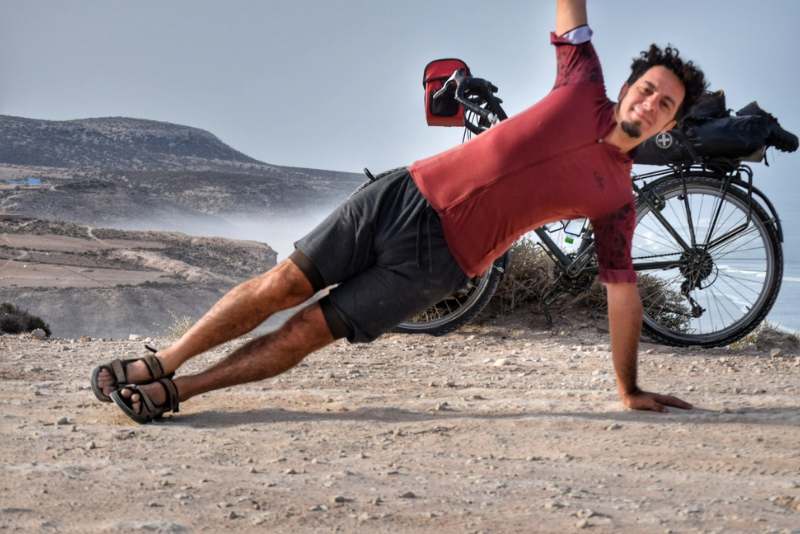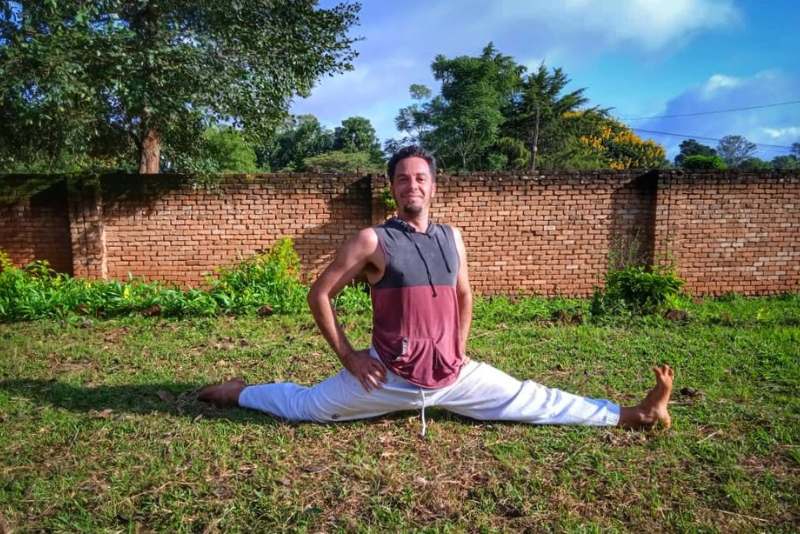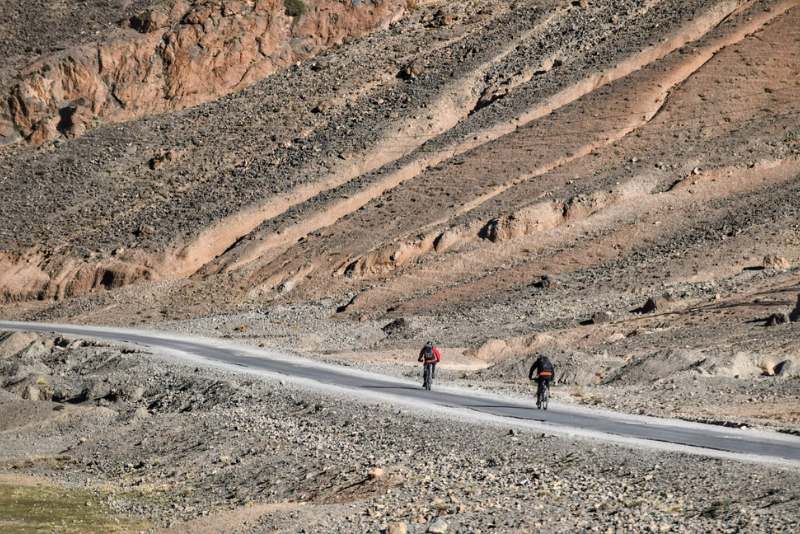Last Updated on 10 July 2024 by Cycloscope

Discover the many health benefits of mountain biking!
Learn how this physical exercise can improve your well-being
Explore the advantages of mountain biking today!
You might be already an avid mountain biker (like us), or someone who’s looking around to find an activity that could improve your quality of life. Whatever your purpose was when you ended up here, we are going to prove to you how science has reached an incredibly wide consensus about the many health benefits of mountain biking.
Mountain biking is a thrilling and adventurous sport that offers an array of benefits for both your mind and body. Whether you’re an experienced rider or just starting out, mountain biking is an excellent way to get outside, get active, and improve your overall well-being.
Since we started cycling in the great outdoors, many years ago, our bodies have been getting better and better, instead of decaying as age is believed to do. But the most impressive benefits have definitely been on our mental and spiritual well-being – happiness has become our most common state of mind, while stress, psychosomatic symptoms, and insomnia have become things of the past.
In this thoroughly researched article, we are gonna go through a plethora of peer-reviewed studies to see what science has to say about the benefits of mountain biking.
So buckle up, here are 13 fantastic benefits of mountain biking that might just surprise you.
Check Also:
> The Thrilling History of Mountain Biking: A Journey Through Time
13 Benefits of Mountain Biking in a Nutshell
1. Improved Cardiovascular Health

You know what they say, “An ounce of prevention is worth a pound of cure.” And that’s exactly what mountain biking does. It’s like a shot of espresso for your ticker. Just a little bit of time spent pedaling those hills and you’re pumpin’ that blood, gettin’ that heart rate up, and workin’ those lungs. I mean, it’s science!
One of the most well-known benefits of mountain biking is its impact on cardiovascular health. As an aerobic exercise, mountain biking benefits your heart by strengthening the pericardium and improving blood circulation.
According to a study published in the Journal of Sports Medicine and Physical Fitness, mountain biking can increase heart rate and oxygen consumption, leading to improved cardiovascular fitness. Let’s see why.
When you engage in aerobic exercises such as mountain biking, your body needs to pump more blood to deliver oxygen to your muscles. This increased demand on the heart and blood vessels leads to improved cardiac function, including increased stroke volume (the amount of blood pumped per beat) and decreased resting heart rate.
Improved blood circulation means that your body is more efficiently delivering oxygen and nutrients to your cells, including your heart muscle, which in turn can improve the overall health and function of the heart.
The harder the better! The resistance provided by pedaling a mountain bike, especially when riding on challenging terrain, can increase muscle activity and stimulate blood flow, further improving cardiovascular health.
These physiological responses to mountain biking can ultimately lead to long-term improvements in cardiovascular function and overall health.
2. Enhanced Muscle Strength and Endurance

So, when it comes to mountain biking, let me tell you, it’s not just about riding through beautiful scenic trails and enjoying the great outdoors. It’s also about getting a kick-ass workout for your muscles.
When you’re out there pedaling away on your mountain bike, you’re using a whole bunch of different muscles. Your quads, your hamstrings, your glutes, your calves, and even your core are all getting in on the action.
The more challenging the terrain, the more muscle groups need to work together to maintain balance and control. Your muscles are being activated and challenged in a big way!
And what do you get when you challenge your muscles like this? You guessed it – they get stronger and they can endure more. The repetitive nature of pedaling a bike can also help to improve muscular endurance, allowing you to sustain muscle contractions for longer periods of time. That’s right, mountain biking can help you build strength and endurance in your muscles.
It’s like having your own personal gym on two wheels. And the best part is, you don’t have to spend hours in a smelly gym to get the benefits. You’re out there in nature, breathing in the fresh air, and getting a workout that’s anything but boring.
“
3. Improved Balance and Coordination

You know how when you’re mountain biking, you’re constantly trying to keep your balance and coordination? Well, turns out that’s actually helping you in more ways than one!
The uneven terrain and unpredictable riding conditions require you to constantly make adjustments on your bike, engaging your core muscles, leg muscles, and sensory, proprioceptive, and motor responses.
So, you’re not only having a blast out on the trails, but you’re also improving your overall balance and coordination in a win-win situation.
Mountain biking helps improve balance and coordination due to its dynamic and challenging nature, the uneven terrain and unpredictable riding conditions require the rider to constantly make adjustments to maintain stability on the bike.
It requires a high level of balance and coordination, and as you become more proficient in riding your MTB, you’ll likely see improvements in these areas in your daily life.
In a study published in the International Journal of Sports Medicine, researchers found that mountain biking can lead to improvements in balance, coordination, and stability.
The use of multiple muscle groups, including core muscles and leg muscles, as well as coordination between the eyes, vestibular system, and proprioceptors in the joints and muscles, helps coordinate sensory inputs and precise motor responses.
Wanna get the best handling? Check
> The 9 Best MTB Grips for Downhill, Touring, & Bikepacking
4. Reduced Stress and Improved Mental Health
Mountain biking is an excellent way to get away from the stresses of daily life and enjoy the beauty of nature. Studies have shown that spending time in nature and engaging in physical activity can help to reduce stress and improve mental health.
In a study published in the International Journal of Environmental Research and Public Health, researchers found that mountain biking can lead to improved mood, reduced anxiety/depression, and increased feelings of well-being.
The study concluded that “outdoor recreation can play an important role in promoting mental well-being, as it offers opportunities for restoration, challenge, and enjoyment.
Mountain biking has been shown to have a positive impact on mental health, including reducing stress levels. As a physically demanding sport, mountain biking requires focus and concentration, providing a temporary escape from daily stressors and helping to clear the mind. All of this while being in nature, surrounded by scenic landscapes, definitely promotes a sense of calmness.
So not only does mountain biking offer physical benefits, it also offers mental benefits that can have a lasting impact on our overall well-being. Whether you’re a seasoned mountain biker or a beginner, hitting the trails can be a great way to reduce stress and improve mental health.
5. Mountain Biking Benefits Confidence, and Self-Esteem
In a study published named ‘Extending the Dream Machine’: Understanding people’s participation in mountain biking, researcher Steve Taylor found that people who engage in outdoor activities like mountain biking report higher levels of confidence and self-esteem compared to those who don’t.
Mountain biking can be a challenging sport, but as you become more skilled and conquer tougher terrain, you’ll likely experience increased self-respect and reliance. Let me try to explain the science behind these claims.
One of the key ways that mountain biking benefits confidence and self-esteem is by providing individuals with a sense of accomplishment and mastery.
Every time you complete a challenging trail or technical section, your brain releases dopamine, a neurotransmitter associated with feelings of satisfaction and reward. Over time, this repeated release of dopamine can lead to increased feelings of self-worth.
By providing individuals with the opportunity to push their physical and mental limits, mountain biking can also contribute to increased confidence; as you progress in your mountain biking skills, you may find yourself taking on more challenging trails and technical sections, and with each successful completion, you’ll feel more confident in your abilities.
So, if you’re looking for a way to boost your confidence and self-esteem, consider hitting the trails on your mountain bike. With each successful ride, you’ll be building not only your physical fitness but also a sense of self-worth.
Have a look at
> 13 Best MTB hydration packs based on size, affordability, and unique design
6. Better Bone Health
According to a study carried out by the Physical Medicine and Rehabilitation Unit, IRCCS-Istituto Ortopedico Rizzoli (Bologna, Italy), regular physical activity can help to increase bone density and reduce the risk of fracture.
Mountain biking, as a weight-bearing exercise, can greatly benefit bone health by strengthening bones and reducing the risk of osteoporosis.
Let’s dive into the science behind how mountain biking can promote better health for your skeleton.
Bone health is determined by the balance between bone resorption, the process of breaking down bone, and bone formation, the process of building new bone. Regular exercise, particularly weight-bearing activities, can stimulate bone formation and slow down bone resorption.
Mountain biking, being a weight-bearing activity, can provide the necessary stimulus to improve bone density in the hip and spine, which are areas that are commonly affected by osteoporosis. This increase in bone density can lead to a decrease in the risk of fractures.
But there’s more! MTB can also improve bone structure. The repetitive stress and impact experienced during mountain biking can lead to an increase in bone size, thickness, and microarchitecture, which can result in stronger bones.
So there you have it, folks! Mountain biking is not just great for your muscles, heart, and mental health, it can also boost your bone health in a variety of ways.
7. Improved Posture and Flexibility

In a study published in the International Journal of Sports Medicine, researchers found that mountain biking can lead to improved posture, flexibility, and body control.
Mountain biking requires a range of motion and flexibility, and as you become more proficient, you’ll likely see improvements in your posture and flexibility in your daily life. With its repetitive motions and varied terrain, MTB can help improve posture and flexibility in a number of ways.
Firstly, the constant changes in direction and speed while riding can help engage the muscles in your back, and hips, promoting strength and flexibility. This, in turn, can help improve posture by strengthening supporting muscles and promoting proper alignment.
Additionally, the repetitive motion of pedaling can also help increase flexibility in the muscles and joints of the lower body, as well as improve the range of motion in the knees, and ankles.
Furthermore, research has also shown that engaging in regular physical activity like mountain biking can help reduce the risk of injury and improve overall mobility. The aforementioned study found that participants who engaged in mountain biking showed increased flexibility and range of motion compared to those who did not participate in the sport.
8. Better Sleep: another mountain bike advantage
This one I know very well. I had suffered from insomnia for more than a decade and my life was a real mess until I started mountain bike touring, my problem was gone from day one!
Physical activity can help to promote better sleep, and mountain biking is no exception. At least twenty-nine different scientific studies agree that regular physical activity can help to improve sleep quality and duration, and mountain biking certainly is a hell of a physical activity.
So, what’s the science behind all of this? Well, it has to do with something called the circadian rhythm, which is our body’s internal “clock” that helps regulate our sleep-wake cycle. Engaging in physical activity can help to regulate this clock, leading to more consistent sleep patterns and improved overall sleep quality.
Sleep is essential to our well-being and plays a crucial role in maintaining good health. And while there are many factors that can impact our sleep, engaging in sports, workouts, and the like can have a significant impact.
You see, when we engage in exercise, our bodies produce a natural hormone called endorphins. This hormone acts as a mood-booster, reducing feelings of stress and anxiety, and improving our overall sense of well-being. This can lead to a more relaxed state of mind, making it easier to fall asleep at night.
One more benefit of mountain biking is that physical exertion more often than not leads to an increase in body temperature, which is then followed by a drop in temperature as the body begins to cool down. This drop in temperature can help to trigger feelings of sleepiness, making it easier to drift off into slumber.
So, if you’re looking for a way to get better sleep, why not try taking your mountain bike for a spin? Who knows, you might just find yourself sleeping like a baby… on a bumpy mountain trail, that is!
9. Increased Focus and Concentration
Let me tell you about the science behind another amazing benefit of mountain biking: its impact on focus and concentration.
You see, when you’re out on a ride, your body produces endorphins, which are naturally occurring feel-good chemicals. These endorphins not only make you feel great, but they also help improve your focus and concentration.
But it’s not just the endorphins. Mountain biking also requires you to use multiple cognitive processes at once, including visual scanning, balance control, and decision-making. These cognitive processes work together to increase focus and attention. So while you’re getting a physical workout you’re also getting a mental one!
So, grab your helmet, hit the trails, and get ready to tackle your daily chores with a newfound sharpened mind. Trust me, your boss will thank you for it.
10. Mountain Biking Helps With Weight Loss
This one is so obvious we left it among the last of this long list of advantages mountain bike can give to any person.
So, you know when you hit the trails on your trusty steed and feel the wind in your hair and the adrenaline pumping through your veins? Well, it turns out that all that excitement can have some serious weight loss benefits!
You see, mountain biking is a form of cardiovascular exercise, and when you engage in cardio, you’re burning calories. The more intense the exercise, the more calories you’ll burn. And, let me tell you, mountain biking can be pretty intense!
And, because mountain biking is so much fun, it doesn’t feel like a chore. You won’t even realize you’re working out (well, maybe that’s a stretch…).
One study, published in the International Journal of Obesity found that people who engaged in outdoor cycling lost an average of 6 pounds over the course of 16 weeks. That might not impress you, but keep in mind that the more you ride, the more fat you shed – although of course you shall also work on your dietary habits if you want to get fast and, more importantly, durable results.
So, you can burn calories, have fun, and lose weight all at the same time. It’s a win-win-win situation!
Are you a little overweight? Check
> Bikes For Big Guys! 25 Top Bicycles for Tall / Heavy Riders
> eBikes for Big Guys! 11 Best Electric Bikes for Tall / Heavy Riders
11. Better Environmental Awareness
Here’s a benefit of mountain biking that doesn’t directly affect your health, and still it could be the most important of them all.
There’s wide scientific consensus affirming that we, as a species, are running out of time and need to immediately take action to preserve our beautiful and only planet. Although it’s certainly true that most of the guilt falls upon multinational corporations and governments, all of us still can have an impact on our environment.
Mountain biking can help folks become better environmentalists in many ways.
First and foremost, it encourages people to spend time in the great outdoors, and appreciate the beauty and importance of our natural abode. By being in close proximity to nature, mountain bikers can develop a stronger connection to the environment and a deeper understanding of the impact human activities have on the Earth.
The slow pace of mountain biking allows you to take in the sights, sounds, and smells of nature, connecting you with our beautiful planet in a unique and intimate way.
On a more practical level, mountain biking often takes place in protected wilderness areas, and by participating in the sport, individuals are contributing to the conservation and preservation of these areas, protecting them from being “developed” or damaged.
Mountain biking, and cycling in general, is also a sustainable mode of transportation, reducing the carbon emissions and air pollution associated with driving or taking public transport. By embracing this eco-friendly activity, you can help reduce your carbon footprint.
So, not only are you improving your health, you’re also helping to preserve the planet for future generations to enjoy.
12. MTB Will Boost Your Immune System
The immune system is our armor against all those nasty diseases and viruses out there, taking care of it is the best thing you can do for your physical health.
Engaging in physical activity such as mountain biking has been shown to have a positive impact on our immune system. The mechanisms behind this are still not fully understood, but there is a wealth of evidence to support the idea that exercise can play a significant role in maintaining a healthy immune system.
One of the key benefits of mountain biking is that it increases circulation and helps to deliver essential nutrients and oxygen to all parts of the body, including our immune cells. This improved circulation can have a positive impact on our overall health and well-being, and can help to keep our immune system functioning optimally.
Another important factor to consider is the role of vitamin D in supporting a healthy immune system. Vitamin D is known to play a critical role in regulating the immune system, and, because of modern lifestyle and/or geographic constraints, many people are deficient in this essential nutrient.
Riding a MTB exposes you to sunlight, which helps to boost vitamin D levels and support a healthy immune system. In fact, several scientific studies have shown a correlation between higher levels of vitamin D and improved immune function, including a study published in the journal “Nutrition Reviews” in 2011.
In addition to the physical benefits, mountain biking can also have a positive impact on our mental and emotional health. As we have seen in sections 4 and 5, exercise has been shown to reduce stress and improve mood, both of which are critical for maintaining a strong immune system.
Chronic stress has been linked to a suppressed immune system, so reducing stress through physical activity can have a powerful impact on our overall health.
13. Improve social connections
Mountain biking is not just about getting out and exploring nature, but also about connecting with like-minded folks and forming strong bonds through a shared love for the sport.
When you mountain bike, you often find yourself in groups, those are often friends or family, but when biking with complete strangers, by the end of a ride, you feel like you’ve made new connections.
The sense of camaraderie and community that comes from mountain biking is unmatched, and as a result, you can form stronger relationships and networks that can have a positive impact on your life.
In scientific terms, participating in social activities and having strong social connections has been linked to improved mental health, reduced stress, and even a boosted immune system.
A study published in the International Journal of Environmental Research and Public Health found that people who participate in outdoor recreation, such as mountain biking, are more likely to have greater well-being, life satisfaction, and social cohesion.
So, not only can mountain biking improve your physical health, but it can also help to improve your mental and emotional well-being through the social connections you make.
The Many Helth Benefits Of Mountain Biking: Wrap-Up

In conclusion, mountain biking is a great way to improve your physical and mental health, as well as your connection with the natural world. So, next time you’re considering a new hobby, remember the many benefits of mountain biking!
FAQs about MTB Benefits
Will mountain biking get me in shape?
Yes, mountain biking can definitely help you get in shape. As a form of physical activity, mountain biking provides an excellent workout that can help to improve cardiovascular fitness, build muscle, and increase endurance. It is also a great way to burn calories and lose weight. Because mountain biking can be an enjoyable and engaging form of exercise, it is easy to stick with it and maintain a regular workout routine, but remember, results come from perseverance.
What are the disadvantages of mountain biking?
While mountain biking can be a great form of exercise with many benefits, there are also some potential disadvantages to consider. Some of the most common drawbacks include:
.Risk of injury: Mountain biking can be a physically demanding activity, and there is always a risk of injury, especially for those who are new to the sport or who push themselves too hard. Common injuries include broken bones, sprains, and bruises.
.Equipment costs: Mountain biking can be an expensive sport, as it requires specialized equipment such as a reliable bike, protective gear, and other accessories.
.Accessibility: Depending on where you live, finding good mountain biking trails or terrain may be challenging. In some areas, access to trails and parks may be limited, making it difficult to find suitable terrain for riding.
.Weather conditions: Mountain biking can be weather-dependent, and inclement weather can make the trails slippery and dangerous. Additionally, hot temperatures can be challenging and make it difficult to stay hydrated.
.Physical demands: Mountain biking can be physically demanding and requires a certain level of physical fitness. If you are out of shape or have any underlying health conditions, it may be best to speak with your doctor before starting a mountain biking routine.
While these disadvantages are worth considering, it is important to note that with proper training, equipment, and preparation, many of these risks can be mitigated. If you are considering taking up mountain biking, it is a good idea to speak with a coach or experienced rider to get a better understanding of the sport and its demands.
Is mountain biking better than running?
It is not accurate to say that mountain biking is better than running or vice versa, as both forms of exercise have their own unique benefits. The best form of exercise for you will depend on your individual fitness goals, physical capabilities, and personal preferences. Mountain biking can be a great option for those looking for a low-impact workout that builds strength and endurance, while running is a popular choice for those looking to improve cardiovascular fitness and burn calories. Ultimately, the best form of exercise is the one that you will enjoy and stick with, so consider your own needs and goals when deciding between mountain biking and running.



